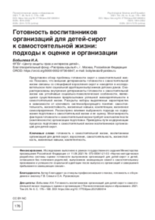Представлен обзор проблемы готовности сирот к самостоятельной жизни. Показано, что внешние детерминанты готовности к самостоятельной жизни связаны со спецификой взросления сирот и находятся в исследовательском поле социальной адаптации выпускников детских домов. Охарактеризованы внутренние детерминанты готовности к самостоятельной жизни как устойчивые социально-психологические особенности, являющиеся существенными предпосылками успешной жизнедеятельности в самостоятельной жизни. Раскрыты наборы выделяемых характеристик в зависимости от ключевого системообразующего понятия: самостоятельность, жизнестойкость, жизненные навыки, компетенции, жизненное самоопределение. Рассмотрено влияние выбранного подхода на содержание подготовки к самостоятельной жизни и ее оценку. Многомерность факторов готовности к самостоятельной жизни требует многоаспектности (комплексности) организации подготовки. Приведены пути модернизации процесса подготовки к самостоятельной жизни воспитанников организаций для детей-сирот.
Low readiness for independent living is what underlies the problems of social adaptation in children and adolescents from orphan organizations. This review explores how scientists and practitioners interpret this very concept of readiness for independent living. It is shown that the external determinants of readiness for independence in orphans are associated with the specifics of their growing up and fall within the research field of social adaptation of orphanage graduates. The paper describes the internal determinants of readiness for independent living as stable sociopsychological features that are essential prerequisites for success in independent living. The sets of allocated characteristics are revealed depending on the key system-forming concept: independence, resilience, life skills, competencies, self-determination. The paper analyzes the influence of the chosen approach on the content of training activities aimed at promoting readiness for independent living and on its assessment. The multidimensional character of the factors related to readiness for independent living requires complex preparation and training. The paper concludes with some suggestions concerning the modernization of such training for adolescents from orphan organizations.

